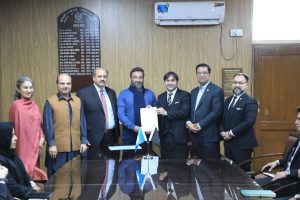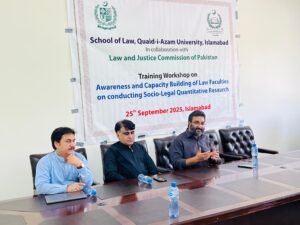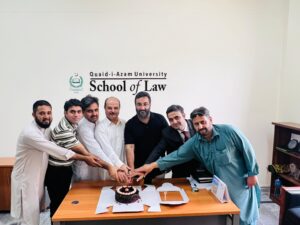News and Updates
A one-day training workshop on the socio-legal method of legal research commenced today at the School of Law, Quaid-i-Azam University (QAU).





























The Competition Commission of Pakistan (CCP), in collaboration with the School of Law and the School of Economics, Quaid-i-Azam University (QAU), organized a special session under its Competition Advocacy Academia Drive titled: “CCP’s Role in Catching Cartels, Prosecuting Deceptive Marketing Practices, and Processing Mergers in Various Sectors of the Economy.”
The event, hosted at the School of Economics, brought together students and faculty members for an insightful discussion on how competition law ensures transparency, fairness, and innovation across markets.
Representing the Competition Commission of Pakistan, Mr. Salman Zafar, Senior Director (Cartels & Trade Abuse, Finance), gave a comprehensive overview of CCP’s enforcement framework. He explained the process of detecting and prosecuting cartels, regulating deceptive marketing practices, and assessing mergers to prevent market dominance. He emphasized that a competitive market structure is essential for consumer welfare and sustainable growth.
Ms. Marryum Pervaiz, Secretary to the Commission and Head of Advocacy, elaborated on CCP’s advocacy initiatives and enforcement actions. She highlighted several notable cases where the Commission took cognizance of anti-competitive practices, leading to significant corrective measures in various sectors, including the pharmaceutical, cement, and transport industries. She underlined the importance of spreading awareness within academic institutions to build a culture of voluntary compliance and informed participation in market regulation.
From Quaid-i-Azam University, Dr. Aziz ur Rehman, Director, School of Law, appreciated the CCP’s outreach initiative and emphasized the need to integrate competition law and policy into the national legal curriculum. He observed that collaboration between regulatory institutions and universities strengthens the relationship between law, economy, and public accountability.
Dr. Javed Iqbal, Director, School of Economics, welcomed the CCP delegation and noted that effective competition policy is vital for economic efficiency and innovation. He encouraged students to engage in interdisciplinary research exploring the nexus between law, economics, and governance.
The event concluded with a lively question-and-answer session in which students discussed cartel detection mechanisms, deceptive marketing regulation, and the role of data-driven analysis in market enforcement. Participants appreciated the CCP’s initiative to connect regulatory practice with academic learning.




